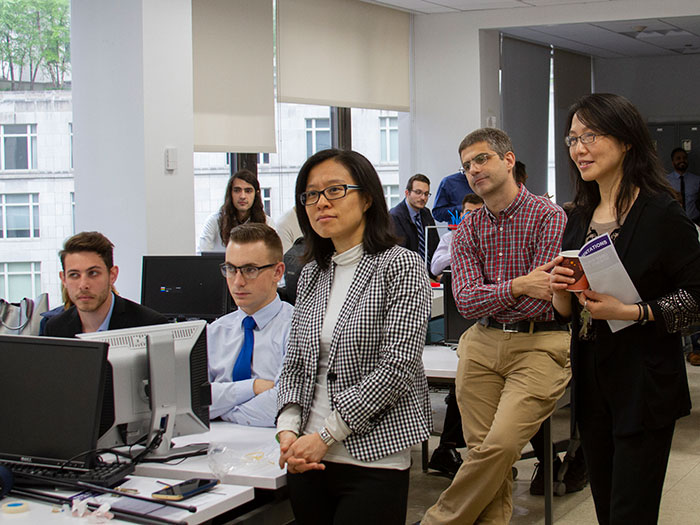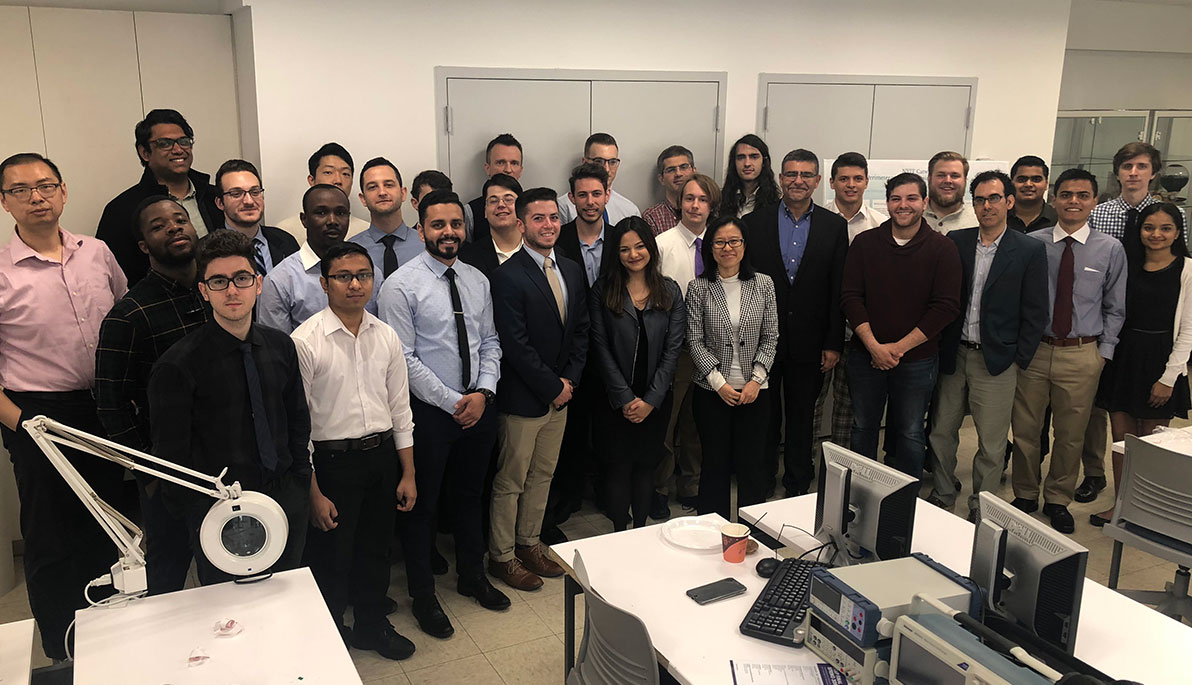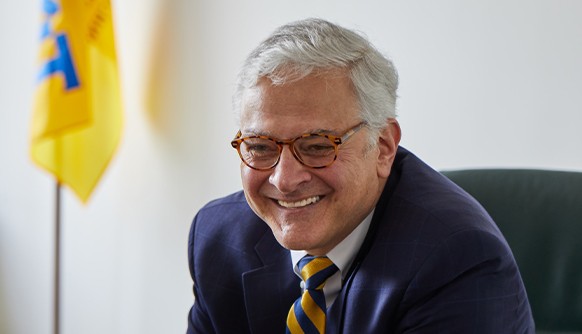News
Undergrad Researchers Tackle Real Challenges
May 30, 2019
Students in the College of Engineering and Computing Sciences presented the culmination of their research projects at the final Undergraduate Research and Entrepreneurship Program (UREP) presentations in May. Nearly a dozen teams showcased their work and addressed questions from faculty and fellow students. Some teams conveyed further findings about projects they began in the fall semester, while others presented new research. Each team also benefited from working with a faculty mentor.
“I am so proud of our undergraduates,” says Babak Beheshti, Ph.D., dean of NYIT College of Engineering and Computing Sciences, who gave feedback to the students throughout the event. “This is real research that has the potential to solve some of our world’s greatest challenges. Our students will be able to draw on this experience throughout their careers.”
Ziqian (Cecilia) Dong, Ph.D., associate professor of electrical and computer engineering and UREP program director, agreed. “We are very proud of the impressive work our students have produced. They are the representatives of NYIT’s maker/doer/innovator culture. We appreciate the time and effort by the faculty mentors providing these research and entrepreneurship opportunities for our undergraduates.”
This year’s projects (see full list below) tackled everything from developing a method to detect cancer using microwave sensors to designing a spectrophotometer that can identify harmful chemical components in water.

Faculty and students at the spring 2019 UREP presentations.
Spring 2019 UREP Projects
Pencil Gripper for Children with Autism
Mentor: Nabi Sertac Artan, Ph.D., Assistant Professor
Student Researchers: Kehinde Williams, Jens Daci, Jonathan Coskuner, Elis Cucka, Mariam Gabriel
Due to Autism Spectrum Disorder, many children’s motor skills have not developed as expected and common tasks like writing can be difficult. This continuing project from last semester is intended to create a device that makes it possible to collect data on the amount of pressure the user applies when using the pencil gripper. With this data, the researcher can take steps to provide more specific feedback for each user that will enable them to improve their handwriting over time.
Air Quality Monitoring System
Mentor: Ziqian (Cecilia) Dong, Ph.D., Associate Professor
Student Researchers: Christopher De Leon, Sangwon Choi
The goal of this project is to increase awareness of the air pollution issue that people face every day around the world. Last semester, the team developed their air quality sensor idea and investigated how to apply their design to address the needs of the market. This semester, they launched the prototyping stage.
Spectrophotometer
Mentor: Ziqian (Cecilia) Dong, Ph.D., Associate Professor
Student Researchers: Mohammad Talha, Omer Ifrach
Many commercial spectrophotometers are extremely expensive. The Spectrophotometer team’s vision is to build an affordable device that can detect different containments present in water. Ultimately, the team hopes it can be used in households to determine if water is safe to drink.
VR Cyber Sickness
Mentor: Ziqian (Cecilia) Dong, Ph.D., Associate Professor
Student Researchers: Stephan Brown, Ajlan Okman, Mohammad Baidas
Although virtual reality headsets are decreasing in cost and becoming more prevalent in therapy, entertainment, and education, cyber sickness remains an obstacle that keeps virtual reality from being universally practical. This spring, the team extended their study on the impact of habituation on cyber sickness with additional haptic feedback. They implemented the environment using the Virtusphere located on the Long Island campus to test their hypothesis with more subjects.
Analysis of Cerebrospinal Fluid Flow in Shaken Baby Syndrome
Mentor: Milan Toma, Ph.D., Assistant Professor
Student Researcher: Cameron Little
Abusive head trauma (AHT), often called shaken baby syndrome, is a leading cause of physical child abuse deaths in children under the age of five in the United States. Using the fluid structure interaction (FSI) model to take cerebrospinal fluid (CSF) into account, this team was able to simulate a more detailed analysis of the brain undergoing excessive shaking.
G.A.P.
Mentor: Aydin Farajidavar, Ph.D., Associate Professor and Amir Javan Khoshkholgh, Ph.D.
Student Researchers: Mateusz Ardito-Proulx, Nicholas Passaretti, Marc Vazquez, Christian Grilli, Ayman Khan
Each year, more than 60 million Americans are afflicted by gastrointestinal diseases. The current monitoring and treatment systems are externally wired to stomach of the patient, which can cause discomfort and presents the risk of dislodgement or infection. This project aims to develop an implantable system that can gather slow waves (SWs) data from the stomach and wirelessly transmit to a web application.
Tell the Story
Mentor: Nabi Sertac Artan, Ph.D., Assistant Professor
Student Researchers: Stefan Teau, Maria Vladucu
This project intends to create audio recognition software for the “story” feature on various social media networks (Facebook, Instagram, Snapchat). The team conducted research to provide market validation for this application and received feedback from potential users.
NYIT Catwalk
Mentor: James Scire, Ph.D., Assistant Professor
Student Researchers: Jon Bukowski, Karol Danowski, Brennen Ward
The objective of this project was to build and test an array of connected, seismic footstep monitoring sensors for use in perimeter surveillance. The sensors use sensitive accelerometers to measure vibrations in the vertical axis. If any station detects footsteps, it alerts all other stations and the home computer, which calculates the location of the footsteps.
Cancer Detection Using Microwave Sensors
Mentor: Reza K. Amineh, Ph.D., Assistant Professor
Student Researchers: Hashir Saifullah Syed, Luke Harrison, Tanvi Patel, Areebullah Saifullah Syed
The goal of this project is to analyze DNA samples to detect cancerous cells using Microwave sensing. The team used machine learning to train a neural network to detect DNA hybridization and ascertain the exact type of cancer present in a patient. The team also conducted a market study to evaluate the feasibility of the project.
PACAderm
Mentor: Jun Ma, Ph.D., Associate Professor
Student Researchers: Jared Freligh, Daniel Mastrocco
This team designed a proof of concept flexible robotic arm with the goal to improve the safety and stability of current rigid robotic systems and increase accessibility by lowering manufacturing, installation, and maintenance costs.
Team CAT (Capture Android Threats)
Mentor: Wenjia Li, Ph.D., Assistant Professor
Student Researchers: Bridget Suski, Rija Ahmed, Matthew Caggiano, Ayman Khan
Malicious Android applications have threatened the privacy and security of users drastically due to their clandestine nature and lack of effective malware detection methodologies. In this project, the team applied machine learning algorithms such as SVM (Support Vector Machine) to differentiate between malicious (malware) and benign applications for Android systems.
Electromagnetic Sensing
Mentor: Reza K. Amineh, Ph.D., Assistant Professor
Student Researchers: Inzamam Haque, Angjelos Marto, Degnin Some
The purpose of this project to develop a sensor to detect a change in environment. For example, the sensors could be used to detect salt concentration or any dilute in normal drinking water or change frequency depending on lead concentration in public drinking water, which could lead to a safer environment for the community.





